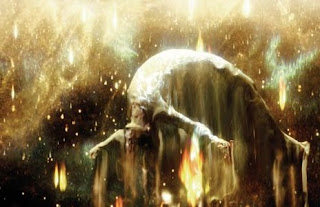Tonight's marathon is a bold one that relies on story arcs that center around science fiction themes such as time travel, finding a cure for death, how events can be altered and changed throughout centuries, fighting to prevent the extinction of your own kind from those hunting you down and being chosen as a leader and savior with a bodyguard sent to protect them in Terminator fashion. It is a bold marathon and one that expands on ideas and principles dealing with science and the universe. For tonight's exciting marathon, we have on the menu:
The Time Machine 2002, Jumper 2008, Jupiter Ascending 2015, The Fountain 2006, Cloud Atlas 2012,
One factor that binds all of these movies together is the fact that nearly all of these movies were either box office flops or critically polarized and split audiences right down the middle in terms of reception. Not everyone came out of these movies totally blown away or sharing a general consensus. It was either you loved these films or you hated them for the ideas they present to you and what they try to preach with their messages. There's no denying though that each film is a visual feast and brings you into different worlds each time whether the timeline is set in the past or present. The first movie of the evening is The Time Machine starring Guy Pearce. Based on HG Welles book, Guy Pearce plays a 19th century inventor trying to alter events in the future after a tragic accident involving his fiance being killed during a mugging. Pearce creates a time machine in hopes of altering the past and instead finds himself traveling 800,000 years into the future where mankind is split into two dividing races. The Time Machine was not a box office success only making 56 million on a budget of 80 million. The message of the film ultimately says that love and companionship are the reasons for why we exist, not technology. Technology can lead to our destruction and we will ultimately pay the price for our own ambitions. The second movie of the lineup is the box office disappointment titled Jumper starring Hayden Christensen and Samuel Jackson. In this film, Christensen plays a young teenager with teleportation abilities finding himself entangled in the middle of an ancient war battle between his own kind and his annihilators. Jumper made 80 million on a budget of 85 million which classifies it as a box office disappointment, and it's reviews were mixed to negative, generating only a 16 percent on rottentomatoes. The message behind Jumper says that people fear what they don't understand and those with special powers can ultimately provoke other people to destory them out of fear. The third movie in the lineup is the box office and critical flop titled Jupiter Ascending. Written by the makers of the Matrix trilogy and Cloud Atlas, the Wachowski Brothers create a story centering around a young woman played by Mila Kunis, learning about her destiny as an heiress of intergalatic nobility and is forced with fighting to protect Earth's inhabitants from an ancient and destructive industry. On a budget of 176 million, Jupiter Ascending only made 47 million domestically and received negative reviews from critics. It's message ultimately says that sometimes having a simple life is far better than carrying the burden of being royal. The fourth movie of the marathon is Darren Aronofsky's The Fountain. Nominated for a Golden Globe for best original score, The Fountain centers around a modern-day scientist Tommy played by Hugh Jackman fighting to save the life of his cancer-stricken wife, Izzi played by Rachael Weisz. While doing so he struggles with mortality with his story arc taking place during the past, present, and future time. The Fountain was met with mixed reviews upon it's release in 2006 and turned out to be a box office flop making only 10 million on a budget of 35 million. The message behind The Fountain is the film says that a person's death is really their rebirth. A bold statement would be to say that The Fountain is one of the most underrated films of the 21st century, and underappreciated. The fifth and final movie of the evening is the Wachowski Brothers box office flop yet polarizing film titled Cloud Atlas. Starring Tom Hanks, Halle Berry, and Hugo Weaving, the story centers around the exploration of how individual person's actions impact others in the past, present and future. Those who are killers are morphed into heroes, and simple acts of kindness occur throughout centuries inspiring a revolution. Much like the other films in this lineup, Cloud Atlas was a box office flop making only 27 million on a budget of 102 million. The overall reception of the film leans toward a positive side with a general consensus which says although the film is confusing and difficult to understand at times, there's no doubt that it's sheer impact, thought provoking narrative, and visuals make the film impossible to not be polarized by it.
So what are these films ultimately trying to say when all of them are put together? The message appears to say that changing time or events in the past and present can alter the events of the future but not without a cost. You either embrace your true destiny or chose to abadon it for a more simpler life. When someone dies, it may be the end of one life but really is the beginning of another. It is not technology that propels the universe and society, it's universal love and compassion that drives it to achieve great things.
Our characters for this evening:

















No comments:
Post a Comment